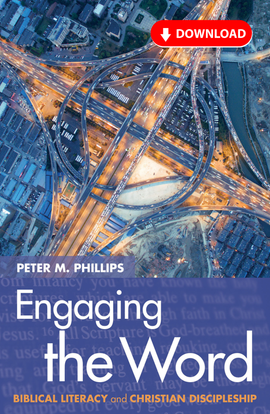The Word's Out: Principles and strategies for effective evangelism today
Product Type: eBook with Glassboxx
Second edition of an evangelism classic
Digital eBook Only - At a time of declining church attendance, this book challenges us to understand that evangelism is more important than ever. The problem is that churches and their leaders often struggle with the idea and concepts around evangelism, unsure of what might be theologically or culturally appropriate ways to communicate the message.
This item is available to purchase from BRF Ministries with orders being fulfilled by Glassboxx, our digital service provider.
| Title | The Word's Out: Principles and strategies for effective evangelism today |
| Authors | David Male and Paul Weston |
| ISBN | |
| Description | Digital eBook Only - At a time of declining church attendance, this book challenges us to understand that evangelism is more important than ever. The problem is that churches and their leaders often struggle with the idea and concepts around evangelism, unsure of what might be theologically or culturally appropriate ways to communicate the message. This book aims to supply principles and strategies for evangelism that are theologically rooted, practical and relevant to the 21st century. It shows how Jesus and the early church did evangelism and what we can learn from them for our situations. There is lots of practical help from two experienced practitioners to develop an evangelistic strategy for your church. It will also encourage leaders at every level of the church to be leaders and enablers in evangelism. The approach is theologically rigorous and powerfully practical, with the focus on redefining a genuine biblical evangelism. It will help you put foundations in place for developing a sustainable strategy in your church so that you can connect not just with those on the fringes but with those who are way outside.
|
| Details |
|
Digital eBook Only - At a time of declining church attendance, this book challenges us to understand that evangelism is more important than ever. The problem is that churches and their leaders often struggle with the idea and concepts around evangelism, unsure of what might be theologically or culturally appropriate ways to communicate the message.
This book aims to supply principles and strategies for evangelism that are theologically rooted, practical and relevant to the 21st century. It shows how Jesus and the early church did evangelism and what we can learn from them for our situations. There is lots of practical help from two experienced practitioners to develop an evangelistic strategy for your church. It will also encourage leaders at every level of the church to be leaders and enablers in evangelism. The approach is theologically rigorous and powerfully practical, with the focus on redefining a genuine biblical evangelism. It will help you put foundations in place for developing a sustainable strategy in your church so that you can connect not just with those on the fringes but with those who are way outside.
This is a fantastic resource, packed with theology, wisdom and practical action about how we can help more people discover the fantastic good news of the gospel. I commend it with enthusiasm.
Mark Russell, Chief Executive, Church Army
This book is a treasure store for church leaders who yearn to see the gospel reach our land anew, giving rich biblically rooted guidance on what sort of evangelism is appropriate for our age.
The Rt Revd Dr John Inge, Bishop of Worcester and Chair of the College of Evangelists
Evangelism is one of those words that seem to have become one of those embarrassing topics of conversations in recent times. I am delighted that Dave Male and Paul Weston have taken the opportunity to challenge the perceptions about evangelism and to encourage and equip people for the task of being Good News today.
The Revd Dr Joanne Cox, Evangelism in Contemporary Culture Officer, The Methodist Church
Essential reading for all those who want to see authentic evangelism back at the heart of the church.
Canon Nick Cuthbert, founder Riverside Church, Birmingham
We need all the help we can get to help ordinary people from all sorts of churches enjoy sharing their faith: bring it on!
Lucy Moore, Messy Church Team Leader at BRF
A welcome contribution to a vital issue - the emergence of a contextually appropriate form of evangelism that empowers congregations to share good news in their communities.
Stuart Murray Williams, missiologist and founder of Urban Expression
As someone who has been involved in church planting over a couple of decades now, there is no doubt in my mind that God's Church needs to rediscover the ability and Holy Spirit anointing in evangelism. My hope is that this book not only encourages us to share our faith but also to more fully understand its imperative.
Major Andrew Vertigan, Salvation Army Mission Partner, Planting
This is the book I wish had been written ten years ago. It makes sense of evangelism in today's world, and offers a thoughtful, engaging, and provocative exploration of why and how we might play our part in God's work of evangelism.
James Lawrence, Leadership Principal, CPAS
This is such a helpful book on one of the most crucially needed areas for this time from two people with the integrity to make it real and doable. Read it and action it and release the Word about the Kingdom!
Fuzz Kitto, International Church Consultant, Sydney Australia
Dave and Paul took a risk writing this. Books that mention the 'E' word simply don't sell as much as those which don't, yet what they have to say is vital for the future of the church, a practical call for all people to engage contextually with the greatest news this world has been graced with. Read it and be inspired.
Revd Chris Duffett, Founder of The Light Project and President of the Baptist Union of Great Britain
The two authors have tapped a rich vein of Biblical and historic insights to come up with a book that will both inform and inspire today's Christians to move away from some negative images of evangelism and engage in ways of inviting others to follow Jesus that will be both authentic to the Gospel and inspirational in a 21st century context.
John Drane, Affiliate Professor of New Testament & Practical Theology at Fuller Seminary, USA, and an Associate Missioner of Fresh Expressions
What does healthy evangelism look like in the West today, so that it remains true to the heart of evangelism but appropriate for our world? This book contributes a much-needed voice of clarity and good Biblical sense to the current conversation.
John Bowen, Professor of Evangelism & Director of the Institute of Evangelism, Toronto
The Revd Dr Paul Weston teaches mission studies at Ridley Hall, Cambridge and is an affiliated lecturer in the Cambridge University Divinity Faculty. A member of the Archbishops' College of Evangelists, he has led over a hundred missions in parishes and universities both here and abroad. He has written widely on gospel and culture issues, most recently as co-editor of Theology in Missionary Perspective: Lesslie Newbigin's Legacy (Wipf & Stock, 2012).
The Revd David Male is Director of the Centre for Pioneer Learning and Tutor in Pioneer Mission Training at Ridley Hall and Westcott House, Cambridge, and Fresh Expressions Adviser for Ely Diocese. A member of the Archbishops' College of Evangelists, he has also written Church Unplugged and contributed to books on church planting and fresh expressions, including Pioneers 4 Life (BRF, 2011) which he edited.
The Reader, Winter 2019
With a foreword by the current Archbishop of Canterbury, this book has timely advice for any church seeking fresh thoughts and ideas for gospel outreach. It immediately reminds us that evangelism is not an abstract concept but ‘the natural overflow of an authentic Christian life’, and that it must be ‘the instinctive sharing of good news’. Jesus’ ministry, the authors remind us, reached people because they were amazed at his life and actions (Mark 1.27). This book is not primarily a source of practical ideas, but a thought provoking re-examination of principles, and thus most useful as background reading within a ministry team planning a church’s gospel outreach. The study is thoroughly based on an intelligent reading of the NT accounts of (especially) Jesus’ dealings with individuals, and the examination of Paul’s sermon in Athens is also particularly interesting. The text includes a useful analysis of such initiatives as the Billy Graham crusades of the 1950s and the contemporary Alpha phenomenon. However, it is interesting that gospel initiatives perceived as successful were mostly ineffective in reaching people with no prior connection with any church.
Reviewed by Richard Carter
Baptist Times online 26.02.19. Review by the Revd Dr Martin M'Caw
Some books are written for a specific readership, be they historians, railway buffs, music lovers or whatever. The target readership for The Word's Out is the Christian world at large. Its purpose is to stimulate evangelism as an integral part of the Christian life and as the Archbishop of Canterbury states in his foreword, the authors 'have performed a service to the church.'
The Word's Out is far from being a dull teach yourself text book. It's a warm, enthusiastic presentation of 'principles and strategies for effective evangelism today.' In doing so there is a historic summary of evangelism in terms of the big evangelistic campaigns of Moody and Sankey in the 19th century or Billy Graham in the 20th, when most men and women in the street had a smattering of Christian knowledge, in stark contrast to our contemporary second and third generation unchurched society.
The authors present a pattern of evangelism that is rooted in the ministry of Jesus and the activities of the New Testament church. They recognise there is a role for the specialist evangelist, but the key to the heart of evangelism has to flow from ministers whose role is necessarily pastor/evangelist, teacher/evangelist leading and encouraging their church members to grow in their love for the Lord so that evangelism becomes not 'a stand alone activity distinct from the rest of discipleship but that natural overflow of an authentic Christian life.'
The encouragement to develop evangelism as an integral part of discipleship is well set in the over-used context of post-modern society which has 'a wider cultural phenomenon of institutional dislocation.' Paul Weston's analysis is that contemporary society is not so much secular as one in which 'belief is drifting away from orthodoxy...disconnected without an anchor' to a smorgasbord of religious and world views.
This is a book which encourages Christians to go with the flow in the love of God, stimulating the passion and drive to grow in the Lord, and looking to help overcome their crises in confidence when talking about the faith. It's an encouragement for fellowships that are demographically challenged by dwindling numbers and a wake-up call to those Christians who only come to church to be fed with a three course sermon.
This is a book for every Christian. Have you heard? The word's out so let's get on with it, to be it and do it so that our evangelism really becomes part of our daily discipleship.
Reviewed by the Revd Dr Martin M'Caw, retired Baptist minister and Wing Chaplain no 2 Welsh Wing RAF Cadets
______________________________________________
The Irish Methodist Newsletter, April/May 2019. Review by Stephen Skuce, Director of Global Relationships, The British Methodist Church
This is, I think, the most readable introduction on the understanding and practice of evangelism from a British perspective currently available. It covers in sufficient rather than obsessive detail how we got to our current state, what an understanding of evangelism looks like, how the Bible views evangelism, and how we engage in evangelism today. Throughout good research is engaged with, but not allowed to turn the text into an academic treatise. Questions at the end of each chapter make this a very useful tool for a home group. This book is really well done.
Dave Male is the Director of Evangelism for the Church of England and Paul Weston leads the Newbigin Centre at Cambridge. Often the weakness of such a background for a Methodist reader is an Anglican assumption of what is the norm and then the need for us to translate to our own context. Male and Weston avoid this and have produced a book that is very accessible across the swath of British Christianity. There is a need for further thinking on some of the contexts in the Republic of Ireland, and thankfully that is starting to emerge from some associated with new churches.
There are a couple of highlights for me in this revised text from the 2013 original. Male considers five main epochs in evangelism in Britain over the past 100 years moving through the 1910 Edinburgh missionary conference, the 1945 Anglican evangelism initiative, Billy Graham's 1954 visit, rise of Alpha from 1990 and the role of Stormzy from 2018. I imagine most Irish Methodists are fine with three of these eras, perhaps a bit hazy about the Anglican initiative after World War Two, and blank about Stormzy. And if so, its our lack of awareness of what the urban rap artist Stormzy's understanding of faith means today that examples our partial dislocation from wider society. Look him up at https://stormzy.com/. Billy Graham he is not, but is an example of a very challenging contemporary understanding and outworking of faith.
Weston's chapter on witnessing from the inside out looks at the way Jesus brought the challenge of full commitment to God out of ordinary circumstances and conversational situations, whereas we more often attempt to insert faith a bit artificially into conversation and can end up arguing for 'Four Spiritual Laws' and the like. This type of expression of the gospel worked well up to recently, however the language of such an approach is increasingly alien to most, but increasingly such an approach is also viewed as inauthentic. Weston points us to the more natural stuff of life that Jesus engaged in as the authentic context for conversations about faith, commitment and discipleship.
This is a fine book, even if the title is a tad quirky. After reading this, well worth going on to Irish Methodism's Billy Abraham and his Logic of Evangelism for a more abstract level of thinking. Let's learn from others, that we might better communicate our faith with those around us today.
Reviewed by the Revd Dr Stephen Skuce,Director of Global Relationships, The British Methodist Church
_______________________________________________
The Magazine - Diocese of Norwich July-August 2016
A challenging book in which the authors acknowledge that whilst there is a lot of missional language being used in the church today this might be masking a diminishing confidence and increasing hesitancy about evangelism. Examining New Testament writers' views, they cite the evangelism of the early church as a natural consequence of discipleship, with followers possessing an instinctive sharing of the good news.
Maybe this could be the model to reverse declining numbers and engage with an increasing majority who have no interest in church activities and a language that is increasingly foreign in a postmodern secular culture?
Steve Foyster
The Word's Out: Speaking the Gospel Today, by David Male and Paul Weston. Weston and Male represent the thoughtful and creative edge of the contemporary English 'fresh expressions' movement. They have a long record in serious theological reflection and sustained personal evangelistic practice. Unlike many evangelistic efforts in the United States, which are obsessed with the church's loss of cultural status, this book works with a sober recognition of how insignificant such matters are to the church in the United Kingdom, just as they are to the church in the United States and Canada.
Reviewed by Patrick R. Keifert, The Christian Century
_______________________________________________








